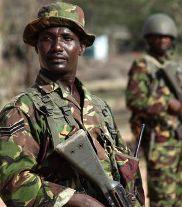
November 23, 2011
Disargreements Flare Over War Plans For Somalia
Image

Disargreements Flare Over War Plans For Somalia
Nov. 22 (GIN) – Fighters from more than four countries are pouring into Somalia supposedly to prop up its besieged government against militants from the Al Shabab Islamist group.
Neighboring Burundi has sent about 4,000 'peacekeeping' troops. Some 5,000 have come from Uganda. Other countries which have pledged or sent troops are Djibouti, Guinea, Nigeria, Ghana, Kenya and Ethiopia.
But the heavily armed forces are a bitter blessing for the Somalis who have suffered high civilian casualties from U.S. drones based in Ethiopia, armored tanks and small arms fire. Somali President Sheik Sharif Sheik Ahmed criticized the military build-up: “There are things we see as inappropriate,” he said during a tour of a Mogadishu neighborhood, “such as Kenyan troops crossing the border into Somalia.”
U.S. officials are also reportedly at odds over the build-up. The Pentagon and CIA favor the tough Ethiopian troops but the U.S. State Dept. cites the catastrophic invasion by Ethiopia of Somalia in 2006 that left thousands dead and injured and the government in tatters.
“The last time Ethiopia entered Somalia did not see a very successful outcome in stabilizing the country,“ said U.S. Asst Secy Johnnie Carson in a recent teleconference with Kenyan journalists. “In fact, it is their presence that spawned Al Shabab.”
Meanwhile, preparations are underway for the 4-day long Lamu Cultural Festival that usually attracts thousands of visitors from Kenya and around the world. Lamu is the oldest Swahili settlement in East Africa and an independent state of Kenya. Due to the presence of pirates from neighboring Somalia and the recent kidnapping of a French tourist, its beaches are off limits to British citizens. w/pix of Kenyan troops
Feet Of Kenyan Runner Amputated After Mishap In Alaskan Blizzard

By Fungai Maboreke
Nov. 22 (GIN) –In a bizarre incident, a champion Kenyan runner lost both his feet to frostbite after being stranded in a blizzard for two days.
Cross country runner and student at the University of Alaska, Anchorage, Marko Chesto Lemtukei, 28, was discovered in minus zero temperature by workers at nearby hotel. Athletic director Steve Cobb said to the Anchorage Daily News, “he was running on a trail at one point, I know that.”
A Kenyan national from Kapenguria, Chesto joined the school’s cross-country running team in 2008. The University has been home to many athletes from Kapenguria .
A student of nursing with top scores, Chesto had been wearing only a light coat, sneakers and no gloves when he disappeared.
It was speculated that Chesto suffered a personal crisis after a team-mate’s suicide earlier in the year.
Due to the severity of the frostbite on Chesto’s hands and feet, his shoes were stuck to his skin. A week after being admitted to the hospital, his feet were amputated on Thursday.
In a statement posted on the school website, Chesto wrote: "While I am still recovering - both physically and emotionally - I will do my very best to give back to the community that has helped me so much and to my home country, Kenya." w/pix of Marko Chesto.
South African Firm Cited For Abusing Workers

Nov. 22 (GIN) – Over 100 foreign workers were expelled from Mozambique after local labor officials said they were illegally employed by Kentz-Engineers & Constructors, a South African firm.
The Labor Ministry said the foreign workers, most of South African and Filipino nationality, were denied holidays, weekends and proper protective clothing. The company also failed to register its Mozambican workers for social security.
Kentz-Engineers is a sub-contractor of the Brazilian mining giant Vale whose coal mine in Mozambique is one of the world’s largest, slated to produce 22 million tons after a new expansion.
Vale’s record is blemished however as far as labor rights and the environment. A strike in Cadbury, Ontario, lasted almost 18 months and environmental violations were reported in Indonesia.
Anabela Lemos, a local environmentalist, said: "It's well known, the (negative) impact of coal mining, which is why some countries don't want any more coal mining… Plus to generate energy, it's more pollution. We don't call that development."
Despite the wealth earned by area mines, Mozambique remains an aid-dependent country. After a spike in prices last year, food riots killed over a dozen people. "This is a new colonial era. This time it's not government; it's corporations," Lemos said.
To make way for the mine, Vale moved about 5,000 people off their land into what they call "settlements."
"Vale told us we had to leave, but I didn't want to," Doratea Mateus told Annie Murphie of the International Reporting Project. "That was our land! Like it here? No, I don't. Here there's nowhere to grow food. And sure, there's water and energy, but you have to pay for it. Back on our land, we had a river for water, and it was free.” w/pix by Zwelethu Mthethwa of a Mozambican miner
Tear Gas ‘ Made in USA’ Fells Protestors in Egypt’S Tahirir Square

Nov. 22 (GIN) – Egyptian riot police fired tear gas canisters bearing the label "Made in U.S.A" at a massive crowd of civilians who re-took Tahrir Square in downtown Cairo to demand justice and an end to new military rule.
Tuesday, the fourth day of protests saw fierce street battles as thousands of Egyptians defied swinging batons, live ammunition and a potent tear gas that according to the canister label was produced by Combined System International of Jamestown, Pennsylvania. CSI also supplied Israeli and Tunisian armies with “riot powder”, according to reports.
“This gas burns the face. It feels like there is poison in your mouth, and it affects your nervous system,” said high school teacher Shadi Mohammed. “They’ve been firing it since 2 p.m. … about 24 hours nonstop. We go forward, then retreat. We don’t know what they want…. I got hit in the head with a rock and took three stitches. I’m still here, and I will stay here until we reach some kind of solution.”
The United States gives Egypt $1.3 billion a year in military aid, supposedly to strengthen and modernize the Egyptian army. But a new report by rights watchdog Amnesty International suggests that since the defeat of President Hosni Mubarak, the new military rulers are repressing the population to a higher degree than in Mubarak’s time.
"What many Egyptians have been seeing over these past 10 months has been that the revolution has been abused and stolen and deformed, and that the military council in Egypt has really not lived up to any of its promises in this transitional period, from human rights abuses to just their complete grip on power," said Sharif Abdel Kouddous, an Egyptian correspondent reporting from Cairo for the news show Democracy Now.
The new uprising began Nov. 18, originally called for by Islamist groups but attended by tens of thousands of men, women and children from across the political spectrum.
More than 33 people have died in the violence according to reports from Cairo’s main morgue and more than 1,500 wounded . A proposed referendum on the immediate transfer of power appears to be a non-starter for the protestors. w/pix of tear gas Made in USA canister